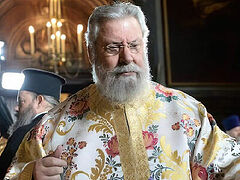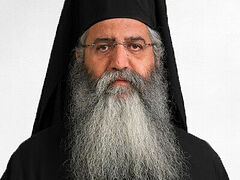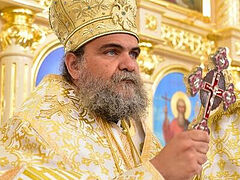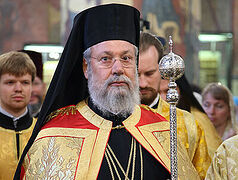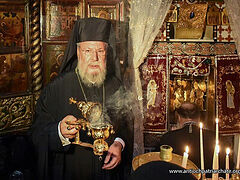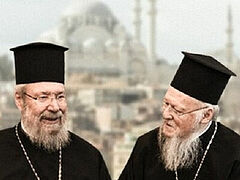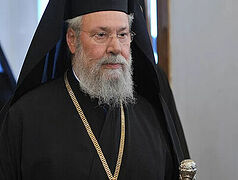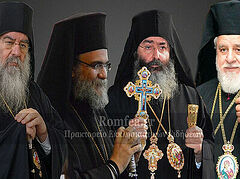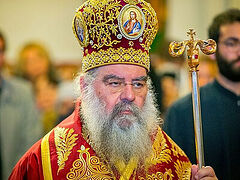Tamassos, Cyprus, November 3, 2020
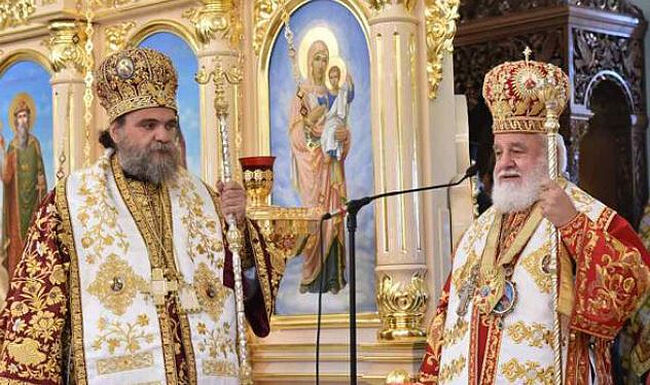 Met. Isaiah of Tamassos (left) and Met. Nikiforos of Kykkos (left). Photo: exapsalmos.gr
Met. Isaiah of Tamassos (left) and Met. Nikiforos of Kykkos (left). Photo: exapsalmos.gr
The scandal surrounding Archbishop Chrysostomos of Cyprus’ decision to recognize the Ukrainian schismatics and to commemorate their primate Epiphany Dumenko during the Divine Liturgy continues.
Four hierarchs of the Cypriot Church immediately drafted an appeal to the Archbishop, calling on him to renounce his unilateral decision, which was made against his explicit promise to the Holy Synod of the Church of Cyprus that he would not commemorate Dumenko. The Archbishop has since explained that he didn’t tell the bishops about his decision because he didn’t want to have to fight with them.
The Archbishop fired back over the weekend, accusing the four hierarchs—Metropolitans Athanasios of Limassol, Nikiforos of Kykkos, and Isaiah of Tamassos, and Bishop Nicholas of Amathountos—of conspiring against him, of forming a “parasynagogue,” and of allowing their “selfish” and “irresponsible” natures to get the better of them. He criticized Met. Isaiah particularly harshly, saying he is too young to have a voice in the matter and should have more respect for the primate, who consecrated him.
And yesterday, Metropolitans Isaiah and Nikiforos responded again, explaining why they are speaking up in the present scandal.
As Met. Isaiah writes in an open letter published yesterday on Romfea, he believes the primate of the Church deserves respect, but this does not mean unconditional agreement on all his positions.
But even when there is disagreement within the Church, it should also be expressed “politely and without insulting derogatory comments,” Met. Isaiah said in response to the Archbishop’s strong words. Calling bishops mere children and accusing them of egotism and irresponsibility “does not correspond to the high position of the primate of our Church,” he writes.
He also reminded the Archbishop of the synodal character of the Orthodox Church, saying that “the consecration of bishops is not a personal matter of the given primate, but is an act of the entire Church by the grace of God,” for Christ promised to be present precisely in the gathering of the faithful.
Therefore, a bishop is not called to obedience to people, but to the Church, which is headed by Jesus Christ. Even though there are different ranks of bishops, there is no superior-subordinate relationship with the primate, “but there is a relationship of the primate among equals,” the hierarch of Tamassos writes.
In the end, every bishop and priest must obey their ecclesiastical consciousness and remain faithful to Holy Tradition and the sacred canons, which must guide them in their every decision, the Metropolitan continues.
Similarly, in an interview with PIK yesterday, Met. Nikiforos of Kykkos notes that when the sacred canons are violated, the hierarchs must speak up, especially when the Archbishop has acted in a papal way and ignored the Holy Synod.
“When they act according to the sacred canons, then our soul rejoices and we support them, but when these rules and timeless Church traditions, as well as sacramental order and practice, are violated, then we react and must react. Because, following the voice of our episcopal conscience, woe to us if we remain silent. If we are mute as fish, we also become accomplices,” the hierarch of Kykkos commented.
It goes without saying, Met. Isaiah writes, “that respect should be paid to every hierarch who, together with others, ordains a hierarch who is of equal consecration. However, this does not mean that in case of disagreement, a bishop is forbidden to express his point of view, which is dictated by his hierarchical conscience, or that he is forbidden to criticize, or worse, that he is obliged to obey, ignoring the dogmatic, canonical, and liturgical traditions of the Church.”
“Consequently, a bishop cannot oblige and obey authorities or persons who, in his opinion, violate the sacred Tradition of the Church,” the Cypriot hierarch emphasized.
He also responded to the Archbishop’s accusation that by formulating an appeal together, Met. Isaiah and the other three hierarchs had launched a conspiracy against their primate, reminding him that “in our Orthodox Church, it is obvious that we can freely meet with our fellow bishops, exchange views, and discuss and reflect on key and important issues that concern both the internal and public life of the metropolitans of our Local Church and universal Orthodoxy as a whole.”
It is wrong to think that such a fraternal meeting of hierarchs is conspiratorial or aimed at undermining the Synodal system of the Church and subverting the primate, Met. Isaiah comments. “However, it is obvious that what happened was a blatant violation of the sacred canons and a violation of the relevant decisions of the Holy Synod and the charter of the Cypriot Church,” he continues, referring to the Archbishop’s unilateral decision to recognize the schismatics.
In their letter of appeal from Saturday, October 24, the four hierarchs spoke of the Archbishop “ignoring and despising his own Holy Synod.”
The holy canons, the charter of the Cypriot Church, and the decisions of its Holy Synod all clearly stipulate that a primate cannot make dogmatic, canonical, or liturgical decisions without his Synod, nor can a Synod without its primate, Met. Isaiah reminds.
And as His Eminence Metropolitan Neophytos of Morphou of the Cypriot Church and other Orthodox hierarchs have pointed out, “geopolitical games were involved in this ecclesiastical issue, and thus a very spiritual and theological issue was moved to the field of politics.”
Met. NIkiforos comments the same, noting that the problem of the Church of Cyprus is that “some decisions were made under the pressure of geopolitical, geostrategic and geo-economic interests.”
The Cypriot hierarch then recalls that he was sent by the former primate, Chrysostomos I, and his then-abbot Nikiforos of Kykkos to study theology in Russia, aimed at strengthening inter-Church relations, which he considers to be a great honor for himself. He has also taken responsibility for and promoted pilgrimage tourism and pastoral care for the Russian-speaking and Slavic inhabitants of Cyprus. In this, he is doing everything he can “to be consistent in the mission of my Church,” bearing valuable fruits.
Whereas the hierarchs and members of government previously praised him for this important work, pointing to its benefits for Cyprus, there is now a “malicious distortion of the truth on this issue intended to conceal the recent unpleasant Church events from their true theological dimension,” Met. Isaiah writes strongly.
Such McCarthyite tactics, of accusing anyone with any connection to Russia of being a communist and an enemy of the people, “do not discourage me at all,” the hierarch writes, “because, as a bishop with a hierarchical conscience, I am appointed to serve the truth to the end, because this truth is fully identified with the Body and mission of the Church, but is also in complete harmony with the Person of Christ.”
Met. Nikiforos also states in his interview that he is neither pro-Russian, nor pro-American, but cares only to adhere to the sacred canons and the charter of the Church.
“Undoubtedly, our Judge is and remains God, the Holy Synod, and the pious members of our Church, the one Holy Catholic and Apostolic Church,” Met. Isaiah concludes.

